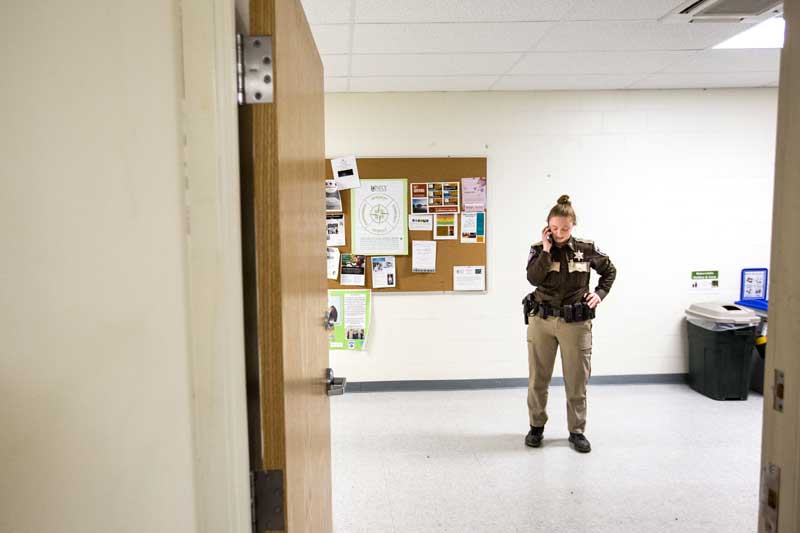When people around Waldo County saw a sheriff’s cruiser consistently following a Unity College van around town this fall, calls were made. What exactly were these students up to that required a consistent police escort?
The answer: geology. And unless you counted that the driver of the cruiser was a deputy for the Waldo County Sheriff’s office ready to start work the moment her class was over, their lab work wasn’t exactly police business.
“Sometimes I show up to class in uniform. Sometimes I’m in my cruiser half dressed,” Mariza Gionfriddo (‘17) explained with a laugh. “I felt really awkward the first few weeks because people didn’t know why I was wearing my uniform. I imagine they were thinking, ‘What is wrong with this girl? What a weird wardrobe.’ But now it’s just my normal.”
Wardrobe issues and curious phone calls are just some of the challenges that face Gionfriddo every day as a full-time Conservation Law Enforcement student and full-time Sheriff’s Deputy for Waldo County. When she’s not patrolling the more than half-dozen towns under her ward from 4:00 p.m. to 2:00 a.m. each day, she’s either sleeping, in class, or studying.

It’s not a life everyone would choose for themselves — while there is no national data on the number of vacancies in law enforcement positions, news reports across the country show many departments, especially in rural areas, are experiencing staffing shortages. At the time of this release, nineteen law enforcement agencies in Maine were advertising job openings on the Maine Criminal Justice Academy website.
Gionfriddo, for her part, loves it. Since working as a reserve officer for Old Orchard Beach two summers ago, she has been eager to get back in the field.
“Once you get into law enforcement, if it’s for you, you miss it once you’re done with it,” she said. “Being in school, I missed it a lot. And I wanted to get back into it without having to miss out on completing my degree. I knew there were a lot of Unity college alumni working for Waldo County, or who had worked for Waldo, so I thought I’d give it a shot.”
So Gionfriddo applied to the Waldo County Sheriff’s Office for a part-time position around Thanksgiving last year. A few interviews, 40 hours of general online training, 80 hours of part-time certification training, and a polygraph later, she was set to kick off her new job as a part-time deputy with 80 hours of field training after school ended in May. It wasn’t long before a full-time position opened up and her new coworkers were encouraging her to put in for it.
Gionfriddo didn’t think she’d get the job, as she was competing against another part-time officer with more years in the field, but she applied anyway — the hiring process for full-time positions is extensive and she wanted to at least get the interview experience. And then, in the midst of the hiring process, another full-time position opened up.
“A few weeks later I got hired full-time, just before school started,” she said. “But I brought up a concern: I’m a full-time student. This is my last semester of college. I didn’t think it would work. But they said they’d work with me and we’d figure certain things out.”
Classes that ran a bit into Gionfriddo’s shift were unavoidable — as an early graduate receiving her degree at December Commencement, she only had so many courses left to take. Her geology lab, for example, was scheduled to run until 4:20 p.m. every Wednesday: 20 minutes past her 4:00 p.m. start time. So her area is always covered, sometimes another officer will be floating in the department schedule around her school conflicts. Other times, people will extend their shifts until she’s able to get out of class.

“Students like Mariza — balancing work, school, life — are becoming much more the norm, and colleges must learn to partner with the students and with their employers to help them manage.” Unity College President Melik Peter Khoury said. “The national trend is away from the traditional right-out-of-high-school young person attending college for four consecutive years. We’re all so proud of Mariza and expect her back soon as an alum to help train the next class of Conservation Law Enforcement graduates.”
“It’s pretty amazing when we see students take on a professional role while balancing school at a young age. The students that take on part-time or seasonal positions, whether with the Maine Warden Service or local departments, tend to be very grounded, motivated and willing to learn,” Assistant Professor of Conservation Law Enforcement Lori Perez said. “The Waldo County Sheriff’s Department is a top-notch institution with strong leaders that were willing to take a chance on hiring Mariza while she was still a student. We are all very proud.”
Gionfriddo will be heading to the Maine Criminal Justice Academy in January, shortly after receiving her degree. At the end of her training she’ll be an officially certified full-time officer able to handle major crimes in her area. But as the job stands now, she’s found her Unity education to be invaluable, and she’s confident her degree will give her a leg-up someday when promotion opportunities arise.
“Lori [Perez] has done an excellent job of training us not just for conservation law enforcement but also traditional law enforcement,” Gionfriddo said. “Anything that I needed to know about beforehand was definitely taught here.”
“Waldo has become my family. We all look out for each other. I could call any one of them at any time of the day for anything and they’d drive across the county to help me out. I’m really grateful to be part of this community.”



